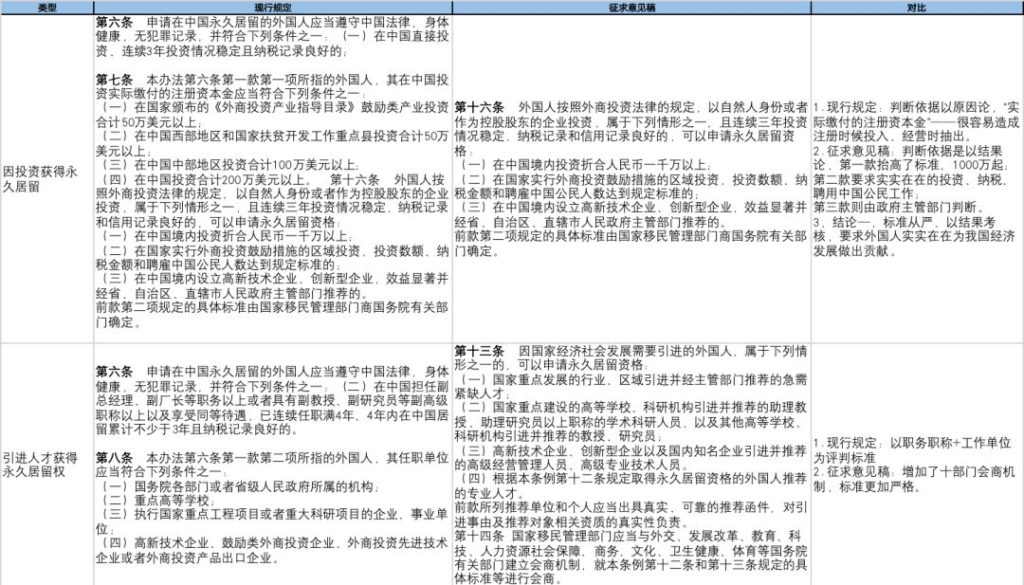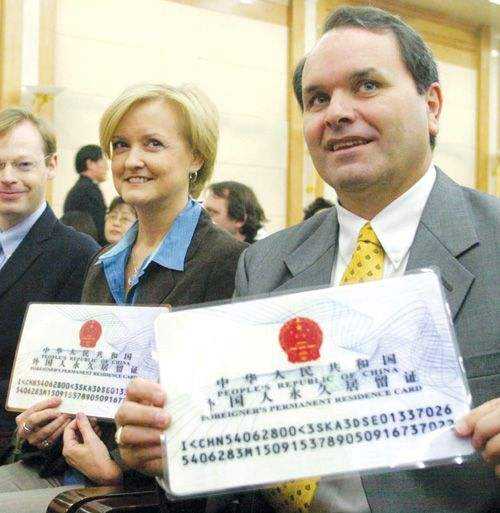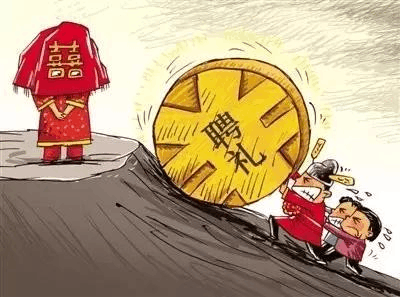On February 27 2020, the Ministry of Justice issued the “Regulations on the Management of Permanent Residence of Foreigners in the People’s Republic of China (Draft for Solicitation of Comments)”, which immediately ignited public opinion.

The fierce response from netizens may be unexpected to the relevant departments. Therefore, the Ministry of Justice, which finally posted the document on Weibo, closed the comments.
The essence of this document is to open three ways for foreigners to get permanent residency in China, one is elite, one is the backbone, and one is marriage. Let’s talk one by one.
First: Elite
For any country, the introduction of elites is a very favorable business.

The U.S. economy took off in the 20th century and was able to become the most technologically advanced country in the world. One of the important reasons is that a large number of elites were dug from Europe during the two world wars.
For example, Einstein was German, he was persecuted because of Jewish descent, then went to the United States, and finally acquired American citizenship.
Most of the time, American immigrants, especially those with real skills, are definitely willing to pay a lot of money.
Before the end of World War II, the United States launched a “paper clip” plan, sending a special action team to carry out the stealing plan with a list of 1,500 outstanding German scientists. The robbed talents got nationality, house and a high salary.
After the disintegration of the Soviet Union, the United States formulated a transition and take-off plan. There are plans to bring people from Soviet research institutes and factories on a large scale. Within three years, 29,500 scientists and engineers were brought from the former Soviet Union.
We must learn from this advanced experience.
Now we are facing a big change that has not been seen in a century, and many countries are facing dilemmas. At this time, we must be prepared to “bring in people”.
A typical case is the disintegration of the Soviet Union in 1991, and then the economy also faced difficulties after Ukraine’s independence. A large number of Ukrainian military experts came to China and made important contributions to the development of Chinese military technology.
But this is a special case. In the past, we were very deadly for foreigners with permanent residency cards. Now we must have a clear policy to control this problem.
In 2004, China issued the “Administrative Measures for the Examination and Approval of Foreigners’ Permanent Residence in China”. This document is mainly aimed at introducing the management of “elite” people. Through the implementation of more than ten years, many problems have also been found. Now, this regulation (draft for comments) is actually to improve and amend the system in 2004.

Let’s compare the difference between this consultation draft and the current management approach.
Through the above comparison, compared with the current method, the current regulations can draw three conclusions:
The first is to obtain the right of permanent residence. Its core principle is to meet Article 3 “should meet the needs of national security and interests.”
The second is to refine the standards, which have been more carefully reflected in the consultation draft;
Third, it is stricter. Whether it is talent introduction or investment, the actual contribution is used as the criterion.
Therefore, this consultation draft should be more scientific and better implemented than the current method.
Second: Backbone
Regarding the “backbone”, Article 15 of this Regulation is aimed at this group.
Article 15: Foreigners who work in China in accordance with the law belong to one of the following situations and have good tax records and credit records, they can apply for permanent residency:
(1) Have a doctoral degree or graduate from a well-known international university, have worked in China for three years, and have accumulated an actual residence period of not less than one year;

(2) Having worked for three consecutive years in key industries and regions where the state has been developing, during which the accumulated actual residence time shall not be less than one year, and the annual wage income shall not be less than four times the average wage of urban employees in the region where they were in the previous year;
(3) Having worked in China for four consecutive years, during which the cumulative actual residence time is not less than two years, and the annual salary income is not less than six times the average salary of urban employees in the region in the previous year;
(4) Having worked in China for eight consecutive years, during which the actual residence accumulated during the period is not less than four years, and the annual salary income is not less than three times the average salary of urban employees in the region where they were in the previous year.

The salary-based annual income stipulated in items 2 to 4 of the preceding paragraph is the minimum standard. The specific standards shall be determined by the people’s governments of the provinces, autonomous regions, and municipalities directly under the central government.
What does this paragraph mean?
Our country is facing a critical moment in industrial upgrading. We must acknowledge that there is a large gap between developed countries in high-end industries such as large aircraft, chips, automobiles, instrumentation, and materials technology.
This gap cannot be filled by bringing in a few leading figures and top talents. We need the supplement of the backbone of the entire industry chain.
Put another way, if we can’t find the leading talents in the international front-line multinational companies, can’t we bring some engineers in some key links? For the transition and take-off plan of the former Soviet Union, the United States bring 29,500 people in three years, most of which were “backbone” engineers.
Judging from Article 15, our standards for “backbone” are high. Of course, some people think that the triple salary standard is very low. If it is a small county, the triple salary may only be 100,000 yuan. Well, some people may think that the annual income of 100,000 yuan is not a talent.
However, these people may have selectively ignored the last article, “The minimum annual salary income stipulated in items 2 to 4 of the preceding paragraph is the minimum standard, and the specific standard shall be determined by the people’s government of the province, autonomous region, or municipality directly under the Central Government of Immigration Management.”
That is to say, if such an extreme situation is really encountered, it is not the local government that can decide it. It must be reported to the National Immigration Bureau for review and determination.

By the way, most people who have been widely questioned by Article 17 do not understand the target of this article.
Article 17: Foreigners who need a family reunion may apply for permanent residency if they fall into one of the following circumstances:
(1) The spouse is a Chinese citizen or a foreigner who resides permanently in China, has lived with the spouse in China for five years after marriage and has accumulated actual residence of not less than nine months each year, with stable living security and domicile;
(2) Children under the age of eighteen refer to Chinese parents residing in China or foreign parents permanently residing in China;
(3) Those who have reached the age of sixty and have no immediate relatives abroad. They have depended on immediate relatives of Chinese nationality living in China or foreign relatives of permanent nationality who have permanently resided in China. Accumulated no less than nine months with stable living security and residence.
The first paragraph of Article 17 belongs to the “marriage” argument, which we will discuss in detail later. The second and third paragraphs are supporting policies that introduce “elite” and “backbone”.
When you introduce a foreign scientist or engineer, it is impossible to allow him to obtain permanent residency alone, and not to allow his immediate family members (not affiliates)-that is, his parents and children are not allowed to obtain permanent residency? How can others work with peace of mind in China?
Without this supporting policy, the so-called encouragement of the introduction of “elite talent” is an empty word. U.S. immigration policy also allows immediate family members to obtain a green card.
Third: marriage
Why open the word “marriage”? My personal understanding is to solve a major social problem-this problem is imminent and has to be addressed.
This is the problem of tens of millions of bachelors in the countryside.

The population problem involves the basic future of the nation, and the biggest problem in China’s population is that the gender imbalance is very serious.
Among those born after 1994, the sex ratio for men and women has exceeded 110, of which the sex ratio for 20 to 24 years old is 110.98, the sex ratio for 15 to 19 years old is 117.7, and the sex ratio for 10 to 14 years is 118.46.

In other words, the gender imbalance is mainly concentrated in young people. In the post-90s age group, the sex ratio has exceeded 110, and after 00, the sex ratio has exceeded 118.
This means that in the future, about 18% of post-00 boys will not be able to pair with girls of the same age.
According to the “Eleventh Five-Year Plan for Population Development and 2020 Plan” released by the State Council, it is estimated that by 2020, there will be about 30 million more men than women in their 20s to 45s.
Scholars such as Shuzheng Li have found that China has experienced severe male marriage squeeze since 2000. After 2013, China ’s male excess population will be more than 10% every year, and it will reach more than 15% between 2015 and 2045, with an average of about 1.2 million per year Men cannot find marriage partners in the marriage market.

Not only will the gender imbalance become more serious in the future, but even more serious, as the urbanization rate continues to increase, the imbalance between men and women in urban and rural areas will increase.
The city has a siphon effect. It can not only attract funds and talents to the city but also more troublesome is that it has a huge difference in siphon capacity for men and women.
To put it simply, rural men can’t stand in the city without the ability, but women can easily get a foothold in the city through marriage.
Originally, there was a gender imbalance in the country, and cities attracted more women, which eventually exacerbated the imbalance in the ratio of men and women in rural areas.

In 2011, researcher Wuyan Liu of Huazhong University of Science and Technology once made a report on “Types of Rural Singles” in which three villages in Henan, Hunan, and Guizhou were selected as samples to study the change of rural singles rates.
It can be seen from this figure that the bachelor rate in the three villages has soared sharply since 1991. Unfortunately, this data only counts to 2006.
In fact, after 2006, the bachelor ’s problem in rural areas is more serious. Although I do not have direct data to support this view, there is a piece of data that can reflect how imbalanced the gender ratio of men and women in this rural area has been in the past decade. This is the data of soaring rural wedding gifts in the past ten years.

In 2018, the Chinese Rural Governance Research Center published a research report, “Poverty Due to Marriage: A Perspective on Understanding Rural Poverty”, which described the changes in rural wedding gifts after the reform and opening up.
According to the data provided by the report, the soaring and alienation of Caili occurred in the past ten years, especially after 2010, when it entered a period of rapid rise.
Taking Ningdu County, Gannan as an example, the wedding gift ceremonies in the 1970s were around 500 yuan and rose to more than 1,000 yuan in the 1980s. In 2000, the gift price was six or seven thousand yuan, in 2005 it reached more than 10,000 yuan, in 2010 it reached about 100,000 yuan, and now the price of the gift has reached 15 million to 200,000 yuan.
After 2005, women’s families not only have requirements for Caili but also have higher requirements for housing.
According to data from the China Statistical Yearbook 2000-2018: the disposable income of rural households increased from 2001 to 2017 and maintained an annual growth rate of more than 5%. Obviously, the amount of rural gifts has grown much faster than the disposable income in rural areas.
From an economic point of view, the sharp increase in the amount of rural gift gifts actually reflects how serious the rural gender imbalance is! (The soaring of urban gifts is also affected by the gifts in rural areas-the logic is that it is the same price to marry a daughter-in-law in the countryside, can the city be lower?)
Why did the rural color gifts rise sharply in the past ten years?
Because China’s urbanization process is accelerating!

In 1978, China’s urbanization rate was only 18%, in 2000 it was 36%, and in 22 years it only increased by 18%. In 2018, China’s urbanization rate reached 60%, and in 18 years it increased by 24%. This is an obvious acceleration process.
The urbanization process has accelerated, siphoning more rural women into the city, and exacerbating the imbalance in the ratio of men to women in rural areas.
Such high gifts in rural areas have overwhelmed many families, and poverty due to marriage has become a common social phenomenon in rural areas.
2020 will be the year when China wins a well-off society, and it is also the most crucial year for poverty alleviation projects. In order to lift the rural population out of poverty, the country has spent a lot of human, material and financial resources.
Relevant national ministries and commissions have trained 7 million cadres for poverty alleviation in the past two years, and more than 700 cadres have directly sacrificed in poverty alleviation work. The intensity is not small, but what about the large number of people who are poor due to marriage in rural areas?
The report concludes that the government should intervene in the phenomenon of high-value rural wedding gifts, and the government is also intervening.
At the end of 2016, the Central Propaganda Department and the Central Civilization Office convened a special meeting, calling for anti-exaggeration and waste, anti-marriage and funeral operations as an important part of rural spiritual civilization construction.
Local government intervention is even greater.
In 2016, in Xiji County, “Xihaigu”, known as the “Barren World”, the government specifically launched an initiative calling for marriage to be simplified and not to be slaves of high-priced wedding gifts. At the beginning of 2017, Taiqian County, Henan Province issued a special wedding gift price guideline, stipulating that the gift price should not exceed 60,000 yuan.
But these interventions have had little effect.
Because as long as the imbalance in the ratio of men to women in rural areas does not ease, government intervention is really weak.

